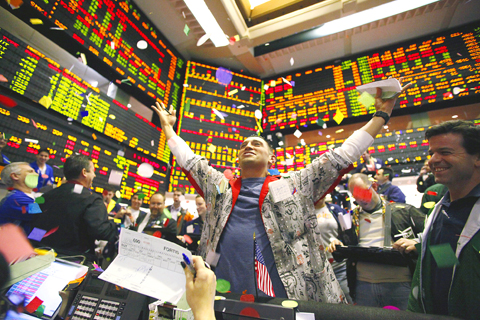Commodity prices rallied last year on keen demand and signs of global economic recovery, with oil soaring and gold striking record levels, while copper and sugar surged.
Many raw materials also rose this week in thin trade ahead of the New Year holiday weekend, with investors winding down for celebrations to usher in the year.
“2009 has been a rollercoaster ride for most commodity markets, with copper, sugar and New York crude performing especially well,” VTB Capital commodities analyst Andrey Kryuchenkov said. “Refined copper and raw sugar were certainly the outstanding gainers as both more than doubled from lows at the start of the year.”

PHOTO: BLOOMBERG
“China’s unprecedented financial stimulus had certainly benefited raw materials linked to the expanding infrastructure and industrial growth,” he added. “Demand [from leading industrialized economies] has yet to show significant and sustained signs of an economy recovery. However, end-of-year data, especially from the United States, was fairly encouraging.”
Back in 2008, crude oil and base metals had forged historic peaks on supply woes, before tumbling as the global financial crisis and recession sparked demand worries.
OIL: Crude oil leapt this year by around 80 percent as traders were heartened by evidence that the battered global economy was on the mend, with the eurozone, Japan and the US escaping a fierce recession.
The worldwide economic downturn had slammed demand for energy and sent oil prices plunging to around US$33 toward the end of 2008.
New York’s main futures contract, light sweet crude for delivery in February, crept US$0.08 higher to close at US$79.36 a barrel.
London’s Brent North Sea crude for February fell US$0.10 to settle at US$77.93.
PRECIOUS METALS: Gold prices sparkled this year, scoring a record peak of US$1,226.56 per ounce at the start of last month, before tailing off as many traders cashed in gains.
The glamorous metal has smashed records on the back of inflationary fears and increasing moves by central banks to diversify assets away from the US dollar, which weakened against the European single currency.
However, by Thursday on the London Bullion Market, gold stood at US$1,104 an ounce, down from US$1,104.50 the previous Thursday.
BASE METALS: Copper soared this week, striking a new multi-month peak, taking its annual gain to more than 140 percent as traders fretted over possible strikes in key producer Chile.
Copper hit US$7,423.75 per tonne on Thursday, reaching the highest level since September 2008.
SUGAR: Sugar prices, which have more than doubled this year, finished the year in style to strike another 28-year pinnacle above £700 on the back of tight supplies, traders said.
By Thursday on the New York Board of Trade (NYBOT), the price of unrefined sugar for March rose to 27.24 US cents a pound from 26.76 cents the previous Thursday.
On LIFFE, London’s futures exchange, the price of a tonne of white sugar for delivery in March climbed to £706.30 from £694.50.

RESILIENCE: Deepening bilateral cooperation would extend the peace sustained over the 45 years since the Taiwan Relations Act, Greene said Taiwan-US relations are built on deep economic ties and shared values, American Institute in Taiwan (AIT) Director Raymond Greene said yesterday, adding that strengthening supply chain security in critical industries, enhancing societal resilience through cooperation and deepening partnerships are key to ensuring peace and stability for Taiwan in the years ahead. Greene made the remarks at the National Security Youth Forum, organized by National Taiwan University’s National Security and Strategy Studies Institution in Taipei. In his address in Mandarin Chinese, Greene said the Taiwan-US relationship is built on deep economic ties and shared interests, and grows stronger through the enduring friendship between

GAINING STEAM: The scheme initially failed to gather much attention, with only 188 cards issued in its first year, but gained popularity amid the COVID-19 pandemic Applications for the Employment Gold Card have increased in the past few years, with the card having been issued to a total of 13,191 people from 101 countries since its introduction in 2018, the National Development Council (NDC) said yesterday. Those who have received the card have included celebrities, such as former NBA star Dwight Howard and Australian-South Korean cheerleader Dahye Lee, the NDC said. The four-in-one Employment Gold Card combines a work permit, resident visa, Alien Resident Certificate (ARC) and re-entry permit. It was first introduced in February 2018 through the Act Governing Recruitment and Employment of Foreign Professionals (外國專業人才延攬及雇用法),

The Ministry of Transportation and Communications yesterday said that it would redesign the written portion of the driver’s license exam to make it more rigorous. “We hope that the exam can assess drivers’ understanding of traffic rules, particularly those who take the driver’s license test for the first time. In the past, drivers only needed to cram a book of test questions to pass the written exam,” Minister of Transportation and Communications Chen Shih-kai (陳世凱) told a news conference at the Taoyuan Motor Vehicle Office. “In the future, they would not be able to pass the test unless they study traffic regulations

EUROPEAN TARGETS: The planned Munich center would support TSMC’s European customers to design high-performance, energy-efficient chips, an executive said Taiwan Semiconductor Manufacturing Co (TSMC, 台積電), the world’s largest contract chipmaker, yesterday said that it plans to launch a new research-and-development (R&D) center in Munich, Germany, next quarter to assist customers with chip design. TSMC Europe president Paul de Bot made the announcement during a technology symposium in Amsterdam on Tuesday, the chipmaker said. The new Munich center would be the firm’s first chip designing center in Europe, it said. The chipmaker has set up a major R&D center at its base of operations in Hsinchu and plans to create a new one in the US to provide services for major US customers,